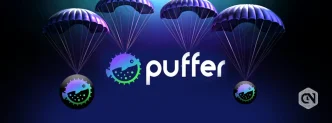EigenLayer’s AVS mainnet launch marks a significant milestone in the development of Ethereum staking systems. Active validation services, or AVS, are critical for increasing the security and effectiveness of blockchain networks. EigenLayer restakers manage and secure these services, which include networks, middleware, chains, and point-of-sale systems.
The introduction of the AVS mainnet marks the completion of EigenLayer’s work to build a solid infrastructure for Ethereum staking. With the mainnet currently online, stakeholders may use EigenLayer’s platform to engage in staking activities and collect rewards for actively recognized services.
With its launch, ETH’s usefulness has increased, and investors now have more chances to generate revenue in a decentralized environment. EigenLayer’s launch of six new actively certified services expands its ecosystem and enhances its value proposition. These services are designed to address a wide range of requests within the Ethereum ecosystem, from scaling solutions to real-world data integration.
The six additional actively validated services address a range of needs within the Ethereum ecosystem, from real-world data integration to scalability solutions.
Advertisement
AltLayer seeks to use EigenLayer’s staking architecture to increase the speed and effectiveness of Ethereum transactions. Ethereum may be made more scalable overall with MACH rollups, which also lay the groundwork for future growth and adoption of the platform. Brevis’s Coprocessor opens up a new method for executing smart contracts by enabling trustless configurable computations.
The Ethereum native oracle from Eoracle serves as an interface between blockchain networks and external data archives. Eoracle provides smart contracts with reliable and validated data sources, making it easier to integrate external data into decentralized apps. Lagrange intends to use EigenLayer’s staking architecture to enhance the security and efficacy of light client protocols, which will benefit Ethereum stakeholders generally.
DePIN uses EigenLayer’s staking infrastructure to try and speed up decision-making by facilitating stakeholder communication. MACH AVS, Witness Chain’s Watchtower, and Lagrange solve scalability and security concerns with Ethereum’s rollup solutions. With the help of this staking, these services hope to increase the dependability and performance of rollup technologies, encouraging more individuals to accept and use layer 2 scaling solutions.
Actively validated services lessen potential security problems by adding an extra layer of inspection and verification, as well as improving network dependability overall. The development of scalable solutions such as MACH rollups and Lagrange’s State Committee addresses some of the Ethereum network’s major scalability challenges.
These services promote innovation and growth in decentralized app and smart contract development by increasing transaction throughput and minimizing latency. Witness Chain’s governance-focused services and DePIN coordination layer aim to improve decentralized governance and decision-making processes in the Ethereum ecosystem. These programs promote community-driven growth, openness, and inclusion by making stakeholder participation in governance processes more accessible.
Advertisement
EigenLayer is poised to alter the Ethereum ecosystem by addressing fundamental concerns and providing new opportunities for all parties involved, with the launch of six new Actively Validated services. Having said that, EigenLayer’s unique strategy has a very promising future.







